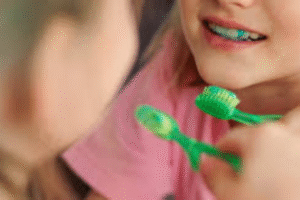Preparing your child for their first trip to the dentist can feel daunting. With a few simple steps, this experience can be smooth and positive. The key is making the unfamiliar familiar. Before the visit, talk to your child about what will happen. Use simple words and keep the conversation light. You might say, “The dentist will count your teeth to make sure they are healthy.” You can also read them a book about visiting the dentist. This can help ease any anxiety they might feel. Practicing at home can also help. Let them open wide while you gently count their teeth with a toothbrush. On the day of the appointment, arrive a few minutes early to let them acclimate to the surroundings. Remember, a supportive, calm approach reassures your child. When visiting a Buffalo Grove, Illinois dentist, this preparation helps create a positive and stress-free experience.
Understanding the Importance of Early Dental Visits
Early dental visits are crucial for setting a healthy foundation. According to the American Dental Association, children should see a dentist by their first birthday. These visits help monitor growth and catch any potential issues early. They also introduce your child to a dental routine, making future visits less intimidating. Early exposure helps establish trust with the dentist, turning dental care into a normal part of life.
Creating a Positive Narrative
When talking about the dentist, focus on the positives. Highlight how dentists help keep teeth shiny and strong. Avoid using words that might scare your child, like “pain” or “hurt”. Instead, use phrases like “clean” and “check”. Let them know that the dentist will help them have a healthy smile.
Role of Parents in the Preparation
Your attitude as a parent plays a big role in shaping your child’s perception of dental visits. Remain calm and confident about the visit. Children often mirror their parents’ emotions. If they sense your anxiety, they might feel anxious too. A relaxed and positive demeanor from you will likely reassure them.
Interactive Activities to Ease Anxiety
Engage your child in dental-themed activities. This can include coloring pages or playing pretend with a toy dentist kit. These activities familiarize them with dental tools and procedures in a fun way. You can also watch videos together that show other kids having their teeth checked. This visual aid helps them know what to expect.
What to Expect at the First Visit
During the first dental visit, the dentist will likely do a gentle exam of your child’s teeth, gums, and jaw. This helps check for any early signs of cavities or other issues. The dentist may also clean your child’s teeth and apply a fluoride treatment. It’s a good time to ask questions about oral health and care.
Comparison of Dental Visit Tips
| Tip | Explanation |
| Talk Positively | Use encouraging words about the dentist to build a positive view. |
| Read Books | Reading stories about dental visits helps demystify the experience. |
| Practice at Home | Role-play dental visits to make the actual visit less intimidating. |
After the Visit
After the appointment, talk about the experience. Praise your child for being brave. Answer any questions they might have. Discuss future visits in the same positive light. Encourage them to maintain good dental habits by brushing and flossing at home. This reinforces the importance of oral care and makes them feel proud of their healthy teeth.
Resources for Parents
More information about preparing children for dental visits can be found through the American Dental Association. They offer a range of resources designed to help parents. The Centers for Disease Control and Prevention also provides guidelines on children’s oral health. These resources ensure you have accurate and reliable information to help guide your child through their dental journey.
In summary, preparing your child for their first dental visit involves creating a supportive and positive environment. By taking these steps, you help your child develop a lifelong healthy relationship with dental care. This foundation is invaluable for their overall well-being.














